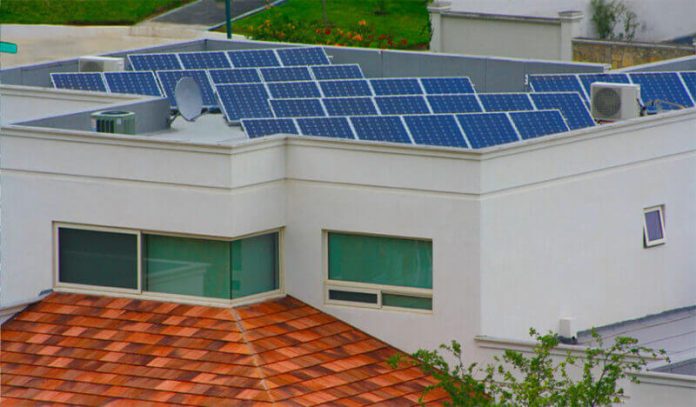The federal government’s proposed electricity reform poses a threat to home solar energy installations, according to energy sector insiders, but Energy Minister Rocío Nahle denies that is the case.
President López Obrador sent a constitutional bill to Congress in October whose main objective is to guarantee 54% of the power market to the state-owned Federal Electricity Commission (CFE)
A vote on the bill is set to take place next April, but there is no guarantee it will pass Congress as the ruling Morena party and its allies don’t have the two-thirds majority required to approve constitutional reforms without the support of opposition parties.
López Obrador’s bill doesn’t specifically mention distributed generation – a term that refers to a variety of technologies that generate electricity at or near where it will be used, such as solar panels – but it does say that private sector electricity generation permits and contracts with the CFE to buy that power will be canceled.
Three energy sector experts who spoke with the newspaper Milenio believe that the reform – if passed in its current form – could spell the end for rooftop solar panels installed on people’s homes and on the premises and facilities of businesses.
About US $3.14 billion has been invested in solar panels, according to the Energy Regulatory Commission, and some 95% of them are installed at people’s homes and at small and medium-sized businesses. Solar is the source of 99.15% of more than 242,000 distributed generation points with wind, hydro, biogas, biomass, gas, diesel and cogeneration contributing to the small remainder.
Julio Valle, spokesperson for the Mexican Solar Energy Association, asserted that the electricity reform will affect distributed generation if it passes Congress.
“I’m aware that the [energy] minister and another person have come out and said that distributed generation won’t be affected but the initiative explicitly says something else,” he said.
Rocío Nahle, energy minister since the current government took office in December 2018, said on Twitter last month that the proposed reform doesn’t seek to eliminate the use of solar panels, while Morena Deputy Manuel Rodríguez González, president of the lower house’s energy committee, later made similar remarks.
Severo López, an energy policy expert and counsel with the law firm SMPS Legal, charged that Nahle’s assertion is wrong, claiming that distributed generation will be deemed “unconstitutional” if the proposed reform becomes law.
Carlos Tapia, CEO of the consultancy Balam Energy, said the wording of the bill is highly ambiguous and that the lack of clarity is cause for concern. The text of the proposed reform leaves open the possibility that homeowners’ contracts with the CFE will be canceled, he said.

But Rodríguez, the deputy, said that homeowners with solar panels won’t be affected because they don’t sign contracts but rather enter into service agreements with the CFE. He did acknowledge that companies that generate their own energy will be affected if the bill passes.
López said that houses with solar distributed generation capacity need to connect to the CFE grid so that they can tap into the state-owned company’s power, or their stored electricity, when the sun isn’t shining. He disagreed with Rodríguez’s choice of language, describing the pact between homeowners and the CFE as an interconnection contract.
Special meters are installed at people’s homes to measure the quantity of energy injected into the national grid via their solar panels and the quantity of power used. Based on the measurements, a homeowner either gets a bill or a payment from the CFE each billing period.
One person who has benefited from installing solar panels at his home is Jorge Musalem. Fed up with paying up to 2,500 pesos (US $120) per month for power, he spent 50,000 pesos (about US $2,400) to install solar panels on his rooftop.
His monthly bills declined to just 150 pesos (US $7), allowing Musalem, who shares his home with five family members, to recoup his investment in less than two years. Thousands of other Mexicans have similarly cut their power bills by putting solar panels on their homes’ rooftops.
Nahle said in her October 6 tweet that the federal government has been a supporter of distributed generation since it took office in late 2018.
“It has promoted its use and funding via the Trust for Electrical Energy Savings,” she wrote, referring to a private trust set up by the CFE in 1990. “The electricity reform doesn’t considering eliminating this,” Nahle added.
More broadly, the government is considered by many to be an enemy of the renewable sector because it has enacted or is attempting to enact policies and reforms that favor the CFE and are detrimental to private renewable energy companies.
With reports from Milenio
